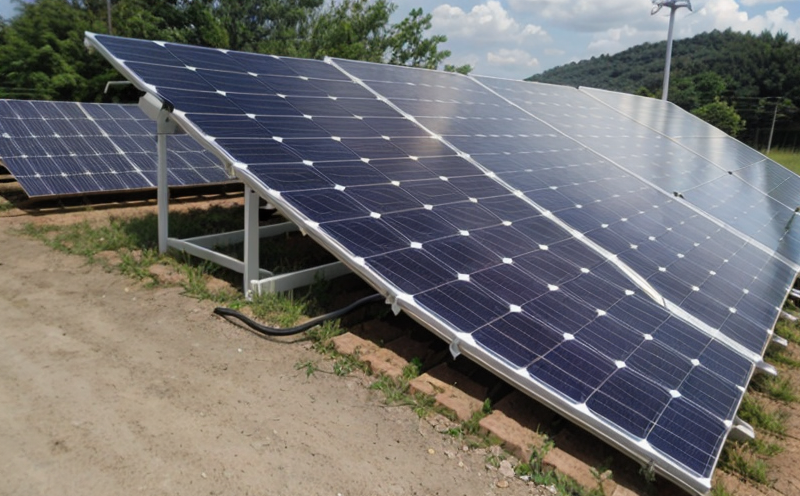IEC 61730-2 Fire Resistance Testing
The IEC 61730-2 standard is a pivotal requirement in the certification and quality assurance process for photovoltaic (PV) modules. This test evaluates the fire resistance of solar panel materials, ensuring that they can withstand potential ignition sources without spreading flames or generating toxic smoke under specified conditions.
Photovoltaic technology plays a crucial role in renewable energy systems worldwide. However, PV panels are not immune to fire hazards. In certain scenarios, fires may ignite due to manufacturing defects, lightning strikes, or other external factors. The IEC 61730-2 standard aims to mitigate these risks by subjecting solar panels to controlled fire exposure tests.
The test methodology involves exposing the PV modules to a specific flame under strictly defined conditions. The panel's behavior during and after the exposure is carefully observed, with key parameters such as time of ignition, duration of flame propagation, and smoke generation being critical metrics for evaluation. Compliance with IEC 61730-2 is mandatory for manufacturers aiming to market their PV products in most major markets.
The test setup typically includes a controlled environment where the PV module is placed on a metal stand. The specimen preparation involves mounting the PV module onto the stand, ensuring that it meets the standard's dimensional requirements. The flame application follows precise protocols defined by IEC 61730-2, including flame height and duration.
After the exposure to fire, the post-test evaluation assesses whether the module has passed based on predefined criteria. These include checking for any structural damage or degradation in performance that could lead to increased flammability risk. Compliance with IEC 61730-2 is not only a regulatory requirement but also a testament to the product's robustness and reliability under adverse conditions.
The importance of this test cannot be overstated, especially for manufacturers who want to ensure their products meet global safety standards. By adhering to these rigorous testing protocols, companies can enhance consumer confidence in their PV products while complying with international regulations.
Applied Standards
The IEC 61730-2 standard is part of a broader set of guidelines that cover the safety aspects of photovoltaic systems. This particular standard focuses specifically on fire resistance and is widely recognized for its stringent requirements.
- IEC 61730-1: General Requirements for Photovoltaic Modules, Systems and Inverters - this covers the general safety, performance, and environmental aspects of PV modules.
- IEC 61730-2: Fire Resistance Testing - this standard specifies methods to evaluate the fire resistance of photovoltaic modules.
- ISO/IEC Guide 98-1: Good Practice for Standardization in Electrotechnology - provides guidelines on how standards should be developed and applied within the electrotechnical field.
These standards form a comprehensive framework that ensures PV products are safe, reliable, and environmentally friendly. Compliance with these standards is essential to avoid potential hazards and ensure product quality.
Why Choose This Test
The IEC 61730-2 fire resistance test is a critical step in ensuring the safety of photovoltaic modules. By subjecting PV panels to controlled fire exposure, this test helps identify any potential risks associated with the materials used and their manufacturing processes.
One of the primary benefits of this test is its ability to detect early signs of flammability issues that could go unnoticed in other testing methods. For instance, some defects may only become apparent under extreme conditions such as those simulating real-world fire scenarios. This early detection allows manufacturers to address these issues promptly, enhancing product safety and reliability.
Another significant advantage is the standardization it provides across different regions and markets. With increasing global demand for renewable energy solutions, ensuring that PV products meet international standards like IEC 61730-2 is crucial for expanding into new territories without compromising on quality or safety.
The test also contributes to reducing risks associated with fires in photovoltaic installations. By demonstrating compliance with this stringent testing protocol, manufacturers can provide reassurance to consumers and stakeholders about the fire safety performance of their products.
In summary, choosing IEC 61730-2 fire resistance testing ensures that your PV modules meet rigorous international standards, enhancing overall product quality and safety while paving the way for broader market acceptance.
Frequently Asked Questions
Use Cases and Application Examples
- Data Centers: Ensuring the fire resistance of PV panels used in data centers helps prevent potential fires that could disrupt critical operations.
- Residential Rooftops: Fire-resistant PV modules are essential for homes, particularly those located in areas prone to wildfires or other fire hazards.
- Solar Farms: Large-scale solar farms benefit from the increased safety provided by IEC 61730-2 compliant panels, reducing the risk of catastrophic fires that could lead to significant losses.
The versatility and reliability offered by PV modules that pass this test make them suitable for a wide range of applications. From small residential installations to large-scale commercial projects, ensuring fire safety is paramount in all scenarios.





